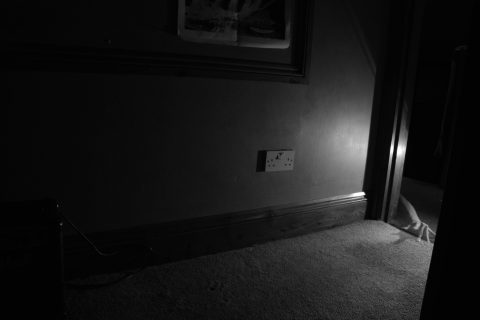Death snuck in around 7 a.m., probably with the cat. It sat on the bench by the large window and watched the neighbor children off to school. Miriam thought what she was seeing was a swirl of dust motes rising nearly to the ceiling—Death being transparent in daylight—so she tried to fan it out the door or at least break it up before it brought on her allergies.
But when it didn’t budge, she recognized it. “Oh. It’s you.” Her years volunteering at the nursing home after her daughter moved out had introduced her to this strange figure lurking in the corners, perching on the curtain rods. She’d felt it coming the way one starts to think about a far-away relative and then the phone rings.
She made them tea from a jar she’d kept on her windowsill, a present from Loreen’s trip to England. The tin was rectangular; pictures of four well-known castles around it: Buckingham Palace, Windsor, Hampton Court, and Parliament. The top was shaped into parapets and turrets, and her old hands could not manage to put the lid on again. She’d thought she might like to see those for herself one day, but time had eeked on ahead, bringing with it a cascade of joint aches and slipped discs and pains all over for no reason whatsoever. So, she held the tin for a long time, turning it about in her hand and imagining herself standing where the photographer stood. And yet, to bring it close enough to create this illusion was to bring it too close to see in focus.
She set one mug on the windowsill and then slipped into her favorite chair. She guessed Death didn’t take tea but better to be polite than stingy. The tea was bitter and stale, dried-out and aged from sitting so many years, waiting for the right occasion for sharing.
“What is it those English people say?” she asked. “‘It’s gone off’? Pity. Loreen told me it was good.”
By the afternoon, she had finished the hat she’d been knitting, though she didn’t bother weaving in the tail—the part she hated most. Loreen could do that later; the hat was meant for her anyway. Death moved to a perch on the mantle. The ringing of the phone startled it and a picture frame fell to the floor.
“I told you that wasn’t a good idea,” she said, and bent down to pick up the broken frame. “Oh, it’s this one.” She unhooked the felt backing and removed the photo—a young man and woman sitting on a bench on a hill overlooking the sea, taken from the back. What you couldn’t see was the way he held her hand, all his fingers cupped around all of hers. Or that this photograph was not of Carl, but the man she had thought she would marry until a letter from his sister brought his death to her doorstep, just another of thousands who would die that day on a beach or in a forest or on the sea so many miles away. After what was deemed too long a time by some (her family) and too short by others (his), she agreed to wear the dress she’d bought with another man in mind, and they trundled along comfortably until the day when Carl was neither young nor old, simply no more. A narrow rise under the blankets like the soft hills of a mountain range too small to be acknowledged on maps, a range only locals know, or care to remember, the name of. Loreen had said over and over “how horrible. How horrible!” but it wasn’t really so terrible, not nearly so bad as the theft of that first grief. And after the pain passed—didn’t they all, though at the time you think they can’t possibly?—she was mostly glad it had happened at home, in their bed, together. She bent the photo in half and tucked it inside the lip of her bra.
For dinner, the woman called the neighbor boy over from his yard, gave him forty dollars and told him to order whatever was good from the Thai restaurant she’d been meaning to try. He could keep the change for himself. She wanted him to return for the leftovers the next day, but couldn’t figure how to plan it so he wouldn’t see anything unpleasant. How she hated to see good food go to waste.
By nightfall, Death had moved to the corner by the door. The sun gone to sleep, darkness clung to Death so finally she could see him.
“You’re not as tall as I remember,” she said. “Why, you’re no taller than an umbrella.” She meant one of those large, golfing umbrellas Carl had preferred to use.
Death shrugged. One did not have to be so tall for this. Not really.
As night crept on, Death crept closer. It was most jarring when he stood in the middle of the room, watching her.
“Perhaps you’d go round by the walls?” the woman suggested.
Again, Death just shrugged.
The woman sighed. “I guess the rook can no more go diagonal than the bishop goes straight.” She held up her book. “But do give me a bit, dear. Just five chapters left.”
By the final chapter, Death sat beside her on the couch. She closed the novel and put it on her leg. Little Death held out a black hand like a child ready to cross the street. She took it. Outside, a car raced down the street, its wheels bright and crisp on the wet pavement. The beams of headlights showcased the slanted rain for a second, two.
“Now then, dear. Let’s look both ways.”



 The SmokeLong Grand Micro Contest (The Mikey) is now an annual competition celebrating and compensating the best micro fiction and nonfiction online.
The SmokeLong Grand Micro Contest (The Mikey) is now an annual competition celebrating and compensating the best micro fiction and nonfiction online.